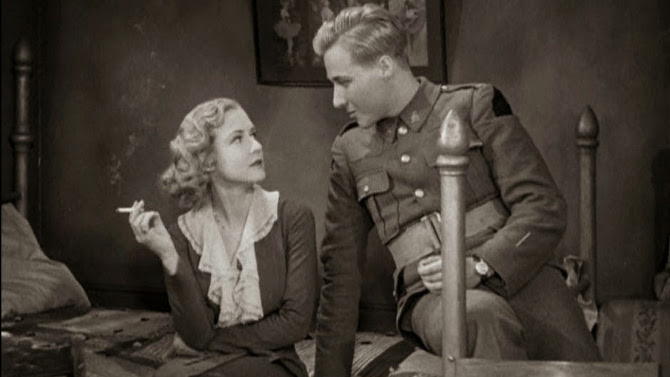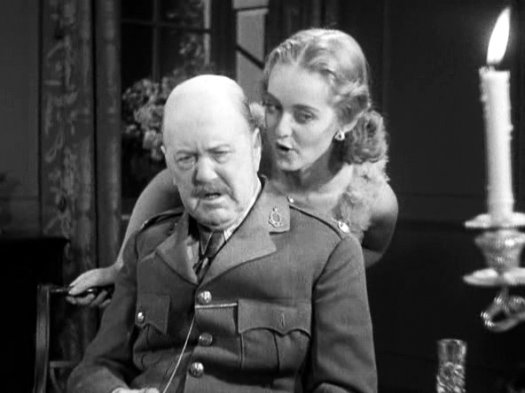One of the great horror directors of the 1930s, James Whale shot Frankenstein, The Old Dark House, The Invisible Man, and The Bride of Frankenstein in just four short years, an impressive feat that also somewhat overshadows a few of his lesser known, non-spook related features – specifically, 1931’s Waterloo Bridge. . . which, interestingly enough, earned Whale so much favour with the head of Universal Pictures’ production department, that Carl Laemmle, Jr. (due to a combination of his quality work and coming in under budget), gave the director the choice of anything the studio had in early planning stages – the filmmaker chose Frankenstein, a smart decision.
His Waterloo Bridge is based upon Robert E. Sherwood’s 1930 Broadway play of the same name (the playwright based it upon many of his own experiences), where we are transported to London, England, circa World War I. Stuck in the metropolis is Myra (Mae Clarke), a chorus girl who has fallen on hard times.
With the era bringing with it limited means of income, she grudgingly becomes a streetwalker along with her friend Kitty (Doris Lloyd). Dangerous in its own right, present circumstances further threaten her life – as air raids are an almost everyday occurrence. During one such evening, fate, or perhaps mere happenstance has her bump into a Canadian soldier on leave, Roy Cronin (Douglass Montgomery) – an idealistic, wet behind the ears youth who has never truly experienced life, or something like it.
Hiding out in her humble apartment, it does not take long for the youthful military man to fall for her good looks, (sometimes) kind hospitality, and seemingly honest aura. Though Myra is having a more difficult time working out her feelings. . . finding someone that finally cares for her for something more than just her nether regions, she feels guilty misleading this honourable, upstanding man.
It is a constant battle with her own psyche, feeling as if she does not truly deserve his attention (though, at the same time, she knits socks for the man after he hints that it would be nice to have someone caring for him back home – as if her soul is screaming out for a nurturing companion after too many long, cold nights).
Things grow ever more complicated after Cronin tricks her into visiting his step-father’s family estate, meeting the nearly deaf patriarch, Major Wetherby (Frederick Kerr), his mother (Enid Bennett), and sister Janet (Bette Davis – in only her third role). Once again, they treat her with such respect, even after Myra reveals her long hidden secret to his mother.
A powerful drama with a more than memorable ending, Waterloo Bridge is truly a pre-Code picture. Featuring that early 1930’s edge, its story of a streetwalking prostitute would not be shown in its original full length version three years later – major cuts were even made at the time in New York City, Chicago and in the state of Pennsylvania. . . in fact, it was actually chopped up in England too, but was still a gargantuan hit. There is also a sequence with see-through lingerie (found after the opening Chorus Girls show) – it is another perfect example of the era.
Though, at the heart of the picture is Myra’s struggle, the complex insecurity and confusion she grapples with constantly. Though Clarke has a small role in Public Enemy and a key one in Frankenstein, this can be seen as her crowning achievement, a complicated performance that she captures with real emotion – Whale was pleased with her performance, much more so, in fact, than Montgomery’s (shutting down production for three days to work with the inexperienced lad). In the end, though, he is more than passable as the cherub-like boy scout, and together, their plight of love in wartime speaks of the stories of love and loss of both World Wars – the hurried nature of it, the past burdens you must deal with in order to soothe your psyche, and the complications of leaving someone with your heart while you head to another country to fight, to name but a few of the pressing issues analysed in this motion picture.
Remade with the same title in 1940 (with Vivien Leigh and Robert Taylor) and as Gaby in 1956 (starring Leslie Caron and John Kerr), the original 1931 version is the most pure interpretation – unsullied by the Production Code or the latter movie’s different ending. Though there are some issues (it drags for parts, while early audio flaws can also be a distraction), it is a moving piece that is deftly handled by Whale. So, watch as love marries war, and discover whether explosive passion can build a bridge between these two contrasting individuals.


